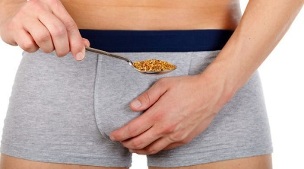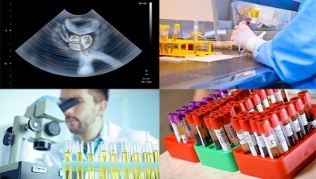
Prostatitis is one of the most common urological diseases in men.
According to WHO research, at least 30% of men between the ages of 20 and 50 suffer from the disease, and every year this dangerous disease strikes young people. Cases of inflammation of these organs have been recorded even in children aged 15-16 years.
Causes of chronic prostatitis
The disease itself is acute and chronic. Chronic prostatitis develops with timely or ineffective treatment of acute prostatitis. Unfortunately, in the form of chronic prostatitis, one cannot rely on full recovery.
Due to the development of this disease, congestive (congestive) prostatitis and infection are also distinguished.
Stagnant prostatitis occurs when circulatory disorders in the pelvic area, as well as stagnation of prostate secretion. Poor permeability and periodic blood accumulation in this area over time lead to the expansion of inflammatory focus. As a result, the prostate gland is deformed, which in turn has a negative effect on neighboring organs.
Enlarged organs can block the urinary tract, interfere with a person's urinary tract function, and even suppress the bladder, causing the urge to urinate. The development of prostate congestion is most often influenced by an inactive and inactive lifestyle. Bad habits and obesity also increase the likelihood of disease.
The cause of infectious diseases is much harder to find than congestive, as these diseases can develop based on many sexually transmitted diseases and fungi. The infection, entering a person through sexual intercourse, spreads throughout the body, but the prostate gland is the first in its course, where most of the pathogenic agents accumulate. The multiplication of bacteria in this organ over time causes its inflammation, and in turn - to the expansion of a kind of purulent focal (even after healing, scars remain).
The infection does not stop in the prostate, some bacteria move through the urinary tract, entering the bladder and kidneys, causing frequent urination.
However, infectious prostatitis is not always the result of a sexually transmitted disease. There are thousands of bacteria and microorganisms in the human body that always come from the world around us. Immunity easily overcomes most of them, unless, of course, it is weakened by the negative effects of smoking, alcohol, constant stress and neurosis. In such cases, the immune system is unable to fully regulate the development of bacteria or fungi, resulting in uncontrolled multiplication, eventually affecting the prostate gland.
Symptoms of chronic prostatitis
The first signs of chronic prostatitis initially appear in the usual urge to urinate and discomfort in the perineum, similar to pain. This can be felt especially if you press lightly on the lower abdomen or anus.
Uneven urine flow is another symptom of chronic prostatitis. Spraying in different directions indicates muscle deformation, which should block the urinary tract (the muscle is located at the base of the prostate gland).
Weakness of the jet is also a negative sign, indicating more about the infectious nature of disease progression, in which several organs of the genitourinary system are affected at once. In some cases, there are problems with erections, but more often it arises as a result of a person’s difficult psychological state.
Disease Diagnostics
The diagnosis in the first stage of prostatitis is the same, whether it is normal or chronic, infectious or stagnant. Such treatment is most often performed by an andrologist (in some cases, a urologist).

After consultation and internal examination, the doctor will write a reference for the test:
- Smear.The collection is performed using a special probe, which is inserted into the patient's urethra (the analysis allows you to find out what bacteria and how much quantity is in the patient's urinary tract). Before taking the test, you need to refrain from urinating for about 4 hours.
- Prostate juice analysis.The prostate gland is porous in structure, and with inflammation, some parts of this organ are just clogged. Although the inflammatory process is ongoing, regular tests do not show anything. This is where the secret analysis (prostate juice) comes to the rescue. The doctor massages the prostate through the anus, removing secretions from the inflamed area, and then collecting them from the urethra.
- Urinalysis.It is usually given after a smear, allowing you to know the pathology of the bladder and kidneys.
- Blood test- Infection tested.
- Ultrasound- examination of prostate, bladder and kidney.
Treatment of chronic prostatitis in men
After completing all the analyzes, the andrologist continues the treatment. If prostatitis is congestive, treatment is easier. As a rule, this consists of taking antibiotics and immunosuppressive drugs. Inflammation is removed with a suppository, which must be inserted into the anus.
With infectious prostatitis, everything is much more complicated, for a more accurate diagnosis, some tests need to be done again. Treatment will be prescribed depending on the severity of the infection. Often these are droplets and antibiotics. The second step is to correct immunity and remove toxins from the body. Along with drug treatment, prostate massage and physiotherapy (electrophoresis and magnetotherapy) are used.
The disadvantage of infectious prostatitis lies in the fact that with proper healing complete, some pathogenic agents still remain in the body and multiply over time, triggering inflammation of the prostate gland. To avoid this, it is recommended to have regular tests and be examined by a doctor.
Often, even after full recovery, the patient complains of discomfort in the perineum area and often urges to urinate. This situation is not uncommon. The fact is that even after the removal process is removed, scars remain on the organ, which interferes with its normal function. To get rid of this problem, there are a number of drugs (suppositories with enzymes) aimed at reabsorption of scars.
Prevention of chronic prostatitis
Treatment of chronic prostatitis is to maximize the prolongation of remission and timely emphasis of new inflammatory processes. To achieve long-term forgiveness and thus avoid periodic visits to the hospital, you need to radically change your lifestyle.
For starters, do not have a fever under any circumstances. Any, even the smallest temperature, can cause deterioration. Simply take the bus in a cool seat or sit in a draft. If possible, avoid inactive work or warm up at least once every hour for five minutes, saying goodbye completely to all bad habits:Smoking and alcohol are strictly prohibited!
In addition, it is important to follow a special diet for chronic prostatitis. It is not recommended to consume smoked meats, excessive fatty foods, carbonated beverages and some types of spices (hot spices).

Include in your diet:
- chicken;
- fish;
- fermented dairy products (cottage cheese, kefir, sour cream with low fat percentage);
- vegetables;
- fruit;
- baby.
The use of pumpkin seeds has a very positive effect on the prostate gland.
If you have been diagnosed with chronic prostatitis, do not be depressed! Yes, the disease is quite complicated, but if you follow all the doctor's recommendations and lead a healthy lifestyle, the constant pain and discomfort will stop bothering you for a long time. Careful care of your health and regular check-ups by andrologists will allow you to live a colorful life!
























